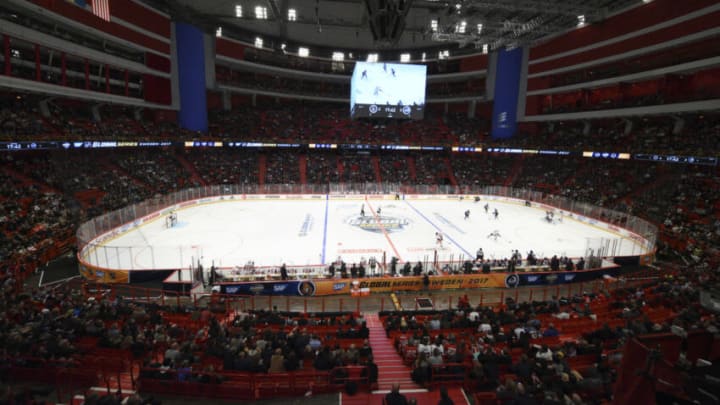Once upon a time, in the not so long ago period known as the early 1990’s, the NHL regular season had 84 games instead of the 82 games we know today. We’ve talked about increasing the schedule to 82 games. Mainly it would give the players a great argument for more money since they would literally be playing more games per year.
One thing about those extra two games is that they were played in neutral site locations. In today’s NHL, plenty of games a year aren’t played at a team’s home arena. The Winter Classic plays in a non NHL venue every year, with whoever is the closest NHL team acting as the “home” team. There’s also the NHL’s International Series that have seen not just preseason, but regular season games take place in different countries. Those countries are mostly Europe. Although the NHL has staged games in China and Russia and will have a preseason series in Australia this year.
If the NHL plays a few extra regular season games a year, those extra games can be held in neutral site locations. It would help bring the game to places that are normally without NHL hockey and grow the game.
Greg Wyshynski of ESPN recently sat down for an interview with new NHLPA president Marty Walsh. Walsh took over from lockout enthusiast (well, that’s what he was to us hockey fans) Donald Fehr last January. Among the topics discussed was the all-important salary cap, but also specialty jerseys, international competitions, and “growing the game”.
Discussions about international tournaments largely revolve around NHL participation in the 2026 Winter Olympics in Milan-Cortina and the return of the World Cup of Hockey. After explaining their current position on that, Walsh went on to discuss how the players are interested in the ongoing NHL International Series:
"“We’ve had great meetings with the league on making sure that as we go to a location in the future, that we make sure [we use] that opportunity to grow the game in those places,” Walsh said."
He also wants the NHL to use international hockey events to reach new audiences. He told the Associated Press that he’s wondered about opportunities for hockey in Latin American countries and among underserved populations in North America.
Sounds like the players would be open to holding more of these “International Series” games. Problem is, whenever a team goes to play in one during the regular season, one or both of the team’s ends up losing a home date. Instead of having 41 home games of revenue, those teams will only have 40. The NHL usually foots the bill for lost ticket revenue. The same concept applies to teams hosting a Winter Classic or Stadium Series game.
Now let’s say we bring back 84 games per year with two of those games being two neutral sight games. Now the NHL can have more teams going international without teams losing out on all important home dates. That can open the door to putting together bigger matchups between top teams. For example, would the NHL ever want to send a Toronto Maple Leafs vs Montreal Canadiens game over seas and lose out on one of their highest grossing games of the year?
There might be a downside to this plan. If every teams plays two of these games every year, the International Series might lose its appeal. Remember the first year of the Stadium Series when the NHL oversaturated its schedule with outdoor games? The NHL might even start to run out of NHL appropriate venues.
Walsh said he hasn’t even had preliminary discussions about expanding the schedule. Meanwhile the NHL has discussed it at an executive level. Perhaps they can compromise and have an 83 game regular season with only one neutral site game a year?
These are both things the NHL and its players have at least though about. Implementing both together could solve two problems at once, adding more games for more revenue while making schedule the international games easier. Sure, there’s a lot of logistics to consider, but if you can solve two problems at once in a way that makes the league and players happy, why not?
